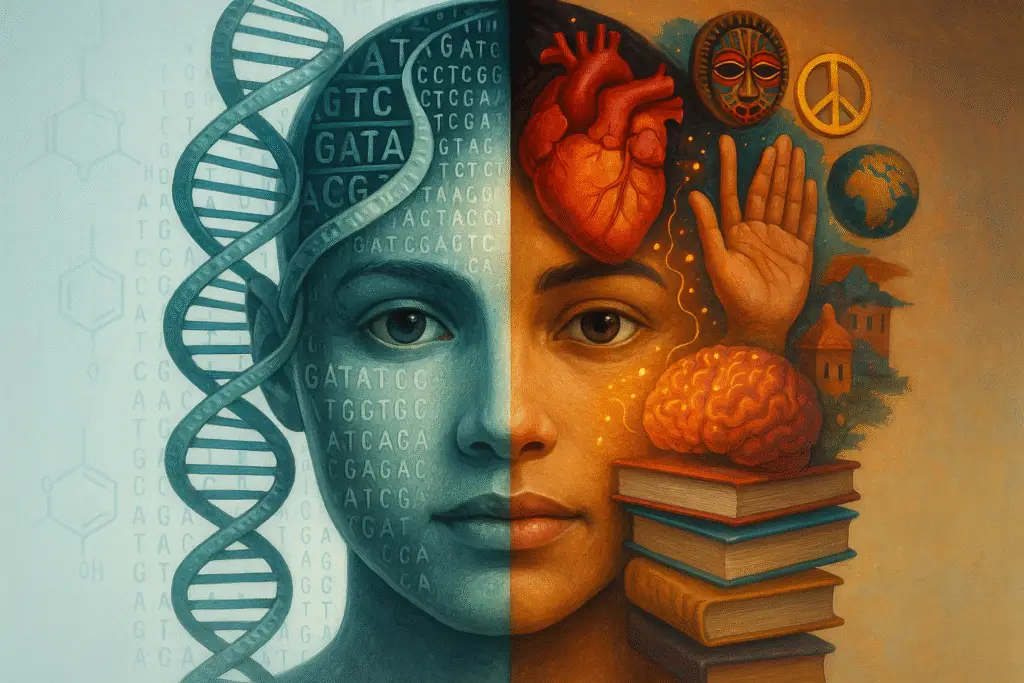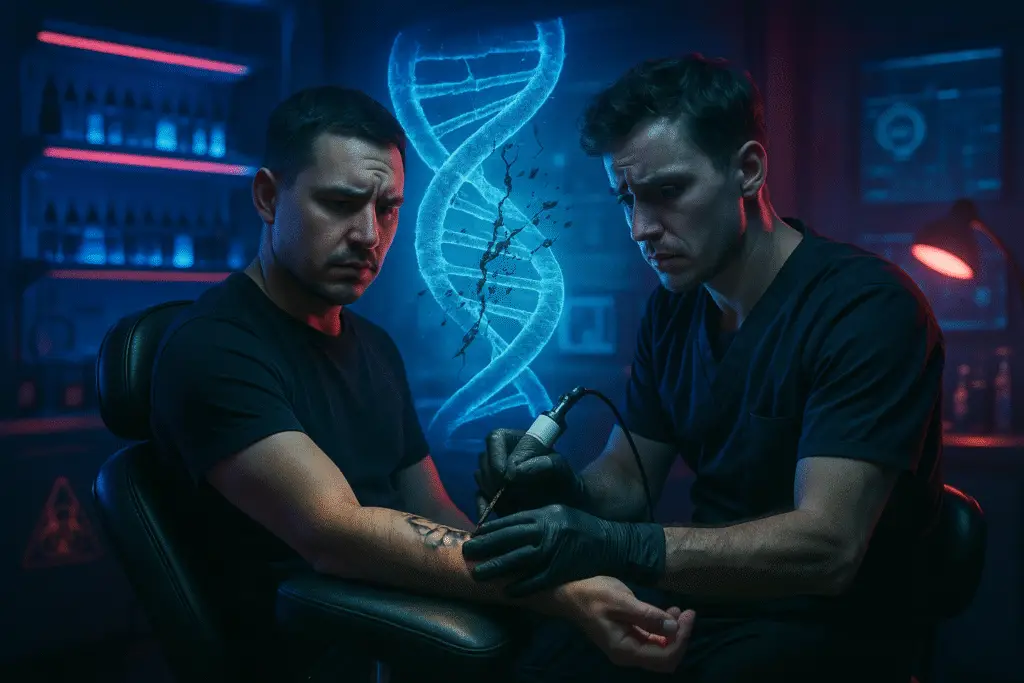According to a 2023 report by the WHO, every second person admits to taking antibiotics without a doctor’s prescription. And 60% of people use self-prescribed painkillers, according to a Global Survey on Self-Medication report.
For many, the first response to even a mild fever, sore throat, and even a simple body ache is to pop a pill without consultation. The mindset here is simple: pop an antibiotic or a painkiller and get quick relief.
Whenever there is a small discomfort like feeling weak or having a runny nose or just a mild headache, the first thing we do is run to the nearest chemist’s shop and grab a strip of tablets. But behind that instant relief lies something dangerous.
The very medicines we trust, when overdosed unnecessarily, can quietly harm the body at the genetic level. Yes, they can damage your DNA just like tattoo ink, cooking habits, toxic chemicals in skincare and excessive sugar.
Okay, I know, you are probably thinking, how can medicine do us harm? They are supposed to heal us. But the truth here can be deceiving, and in this article, we will find out how an overdose of these regular medicines, like antibiotics and painkillers, can be harmful to our DNA and immune system.
Let’s start with the basic mechanism of how antibiotics and painkillers get absorbed into our bodies.
Key Topics:
How medicines are absorbed:
Once inside the body, both painkillers and antibiotics dissolve and spread through our bloodstream to reach different organs and tissues. When used correctly with proper medical guidance, their job is vital. Antibiotics fight harmful bacteria, while painkillers reduce pain, fever, and inflammation.
But the scenario here changes when these medicines are overused or taken without proper medical consultation. Antibiotics, for example, are powerful chemicals that not only target and kill the bad bacteria but also disrupt the balance of good microbes in our gut.
We have also published an article on the relation between the healthy gut microbiome and our genetics. You can check it out for in-depth information. Overuse of antibiotics can cause cellular stress, which, over time, leads to strand breaks in DNA, slower DNA repair and oxidative damage.
Painkillers, on the other hand, can feel harmless because they are so common, but they are not. Overuse of painkillers can overload the liver and other organs. The breakdown of these drugs releases toxic byproducts that can generate oxidative stress and damage DNA.
Medicine and DNA damage:
Now, let us have a look at some of the latest research papers and review articles to understand the effects of antibiotics and painkillers on our DNA by taking some examples of medicines that are known to be genotoxic.
A recent study on human sinonasal epithelial cells reveals that antibiotics can be harmful to ur DNA when overdosed. The researchers exposed cells of a patient to the commonly prescribed levofloxacin and kept a track of what happened for several days.
They found that instead of just targeting bacteria, antibiotics can also trigger oxidative stress in human cells. The chemical stress from the ingestion of antibiotics activated the cell’s death pathways and led to DNA fragmentation.
It was noticed that the higher the antibiotic dose and the longer the exposure, the more severe the DNA damage.
The antibiotic-triggered oxidative stress, leading to DNA breaks and programmed cell death, raises concerns about repeated and high-dose exposure to antibiotics in humans. It is worth noting that while the doses tested were higher, the study gives an important warning that an overdose of this antibiotic can stress our cells and damage our DNA.
Similarly, a study published in the journal Mutation Research/Genetic Toxicology on how paracetamol, a widely prescribed and used painkiller, can interfere with the way our cells repair DNA. Researchers worked on several mammalian cell types, such as human blood cells, human fibroblasts, and HL-60 cells. It was noticed that paracetamol makes DNA repair harder.
When human blood cells were exposed to a chemical mutagen, the cells had about twice as many DNA breaks when paracetamol was present, and those breaks were repaired more slowly.
The bottom line is that while paracetamol is safe for consumers, this study shows it can interfere with a major DNA repair pathway in cells. This means that frequent or high unsupervised use could leave more unrepaired DNA nicks, and over time, this can turn into DNA damage.
Taking the example of another widely used antibiotic, Amoxicillin (AMX) is employed in both human and veterinary medicine worldwide. Researchers investigated whether AMX could cause genotoxic effects. In the study, it was observed that AMX exposure led to DNA damage and cytotoxic effects in the blood cells of common carp.
Several assays revealed increased strand breaks, higher frequency of micronuclei and elevated DNA fragmentation. Additionally, AMX also triggered strong oxidative stress responses and increased caspase-3 activity, indicating cell death.
This study again highlights that the misuse or overdose of this antibiotic can cause potential harm to DNA integrity.
Naproxen, a nonsteroidal anti-inflammatory drug (NSAID), is the largest group of painkiller drugs to which humans are exposed. This drug is used for the treatment of common pain, inflammation and tissue damage.
In a study published in the Journal of Pharmaceutical Analysis, researchers did a controlled in vivo study on rats for 14 days at different doses of naproxen.
It was observed that the drug caused oxidative stress and liver injury. Additionally, the genotoxicity tests showed a clear dose-dependent rise in chromosomal damage. The results show that repeated naproxen exposure can damage DNA and cause mutagenic markers in rats.
Related article: Are Your Allergies Genetic?
Key takeaways:
- Antibiotics and painkillers are often confused with candies and taken very irresponsibly without knowing the harmful effects.
- Studies show certain painkillers and antibiotics can cause oxidative stress, leading to DNA damage.
- Medicines are for our well-being, but when taken in limited amounts and as per the doctor’s prescription.
- Overdose and misuse of these drugs can affect DNA integrity.
- Responsible use under medical supervision is crucial because now we know our DNA health depends on it.
Wrapping up:
As I mentioned before, as soon as there’s a small discomfort, we run to the nearest nearest chemist’s shop and pop up these pills as if they are some candies. But what we often don’t realise is the hidden cost behind that instant relief.
It is important for us to understand that taking medicines without a proper medical prescription can be very harmful to our DNA. The solution here is not fear but awareness and balance. Trust your doctor and take medicines only when truly necessary; don’t make it a habit.
Our goal is to protect our body, not just to feel better in the moment. As responsible humans, we need to safeguard our bodies and our DNA, too.
Resources:
- Ahmad, M.H., Fatima, M., Hossain, M. and Mondal, A.C. (2018). Evaluation of naproxen-induced oxidative stress, hepatotoxicity and in-vivo genotoxicity in male Wistar rats. Journal of Pharmaceutical Analysis, 8(6), pp.400–406. doi:https://doi.org/10.1016/j.jpha.2018.04.002.
- Gunnar Brunborg, Holme, J.A. and Hongslo, J.K. (1995). Inhibitory effects of paracetamol of DNA repair in mammalian cells. Mutation research, 342(3-4), pp.157–170. doi:https://doi.org/10.1016/0165-1218(95)90025-x.
- Kohanski, M.A., Tharakan, A., London, N.R., Lane, A.P. and Ramanathan, M. (2017). Bactericidal antibiotics promote oxidative damage and programmed cell death in sinonasal epithelial cells. International Forum of Allergy & Rhinology, 7(4), pp.359–364. doi:https://doi.org/10.1002/alr.21914.
- Orozco-Hernández, J.M., Gómez Oliván, L.M., Heredia-García, G., Luja-Mondragón, M., Islas-Flores, H., SanJuan-Reyes, N., Galar-Martínez, M., García-Medina, S. and Dublán-García, O. (2019). Genotoxic and cytotoxic alterations induced by environmentally-relevant concentrations of amoxicillin in blood cells of Cyprinus carpio. Chemosphere, [online] 236, p.124323. doi:https://doi.org/10.1016/j.chemosphere.2019.07.054.


